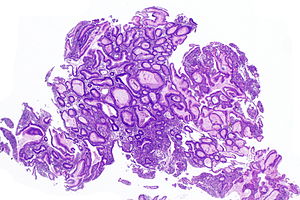Ménétrier's disease
Jump to navigation
Jump to search
| Ménétrier's disease | |
|---|---|
| Diagnosis in short | |
 Biopsy compatible with Ménétrier's disease. H&E stain. | |
|
| |
| Synonyms | diffuse foveolar cell hyperplasia, hypertrophic protein-losing gastropathy, |
|
| |
| LM | marked foveolar cell hyperplasia, decreased parietal cells, +/-inflammation |
| LM DDx | Cronkhite-Canada syndrome, hyperplastic polyp of the stomach |
| Gross | "bag of worms" appearance - very thick gastric folds |
| Site | stomach |
|
| |
| Associated Dx | gastric adenocarcinoma |
| Signs | emesis (intractible), peripheral edema |
| Symptoms | abdominal pain |
| Prevalence | extremely rare |
| Endoscopy | very thick gastric folds |
| Clin. DDx | gastric cancer |
Ménétrier's disease is a very rare pathology of the stomach. It is also known as diffuse foveolar cell hyperplasia,[1] and hypertrophic protein-losing gastropathy.[2][3]
General
- Super rare.
- Increased risk of gastric adenocarcinoma.[1]
Clinical:[4]
- Classical: nausea, emesis, abdominal pain and peripheral edema.
- Emesis (intractable) - most important.
Other:
- Gastric mass (may mimic cancer).
- Hypochlorhydria.
- Protein loss (hypoalbuminemia) - leads to peripheral edema.
Epidemiology:
- Men > women.
- Adults usually 50s.‡
- Associated with ulcerative colitis.
Treatment:
- EGFR inhibitors.[5]
- Gastrectomy.
Note:
- ‡ A similar constellation of symptoms can be seen in children and may be associated with CMV infection.[3][6]
Gross
- "Bag of worms" appearance - very thick gastric folds.
Images
Microscopic
Features:[1]
- Foveolar cell hyperplasia - key feature.
- Decreased parietal cells.
- +/-Inflammation.
DDx:
Images
www:
- Ménétrier's disease - low quality images (upmc.edu).
- Ménétrier's disease - several images from the AFIP (rsna.org).[8]
See also
References
- ↑ 1.0 1.1 1.2 Mitchell, Richard; Kumar, Vinay; Fausto, Nelson; Abbas, Abul K.; Aster, Jon (2011). Pocket Companion to Robbins & Cotran Pathologic Basis of Disease (8th ed.). Elsevier Saunders. pp. 410. ISBN 978-1416054542.
- ↑ Hillman, MM.; Meinarde, LL.; Furnes, RA.; Daruich, ML.; Riva, V.; Cuestas, E. (Oct 2013). "[Protein losing gastroenteropathy and possible relationship to cytomegalovirus infection: Ménétrier disease in a child].". Arch Argent Pediatr 111 (5): 446-9. doi:10.1590/S0325-00752013000500016. PMID 24092036.
- ↑ 3.0 3.1 Meuwissen, SG.; Ridwan, BU.; Hasper, HJ.; Innemee, G. (1992). "Hypertrophic protein-losing gastropathy. A retrospective analysis of 40 cases in The Netherlands. The Dutch Ménétrier Study Group.". Scand J Gastroenterol Suppl 194: 1-7. PMID 1298040.
- ↑ Rich, A.; Toro, TZ.; Tanksley, J.; Fiske, WH.; Lind, CD.; Ayers, GD.; Piessevaux, H.; Washington, MK. et al. (Dec 2010). "Distinguishing Ménétrier's disease from its mimics.". Gut 59 (12): 1617-24. doi:10.1136/gut.2010.220061. PMID 20926644.
- ↑ Toubia, N.; Schubert, ML. (Apr 2008). "Menetrier's Disease.". Curr Treat Options Gastroenterol 11 (2): 103-8. PMID 18321437.
- ↑ Kindermann, A.; Koletzko, S. (Feb 1998). "[Protein-losing giant fold gastritis in childhood--a case report and differentiation from Ménétrier disease of adulthood].". Z Gastroenterol 36 (2): 165-71. PMID 9544500.
- ↑ Junnarkar SP, Sloan JM, Johnston BT, Laird JD, Irwin ST (May 2001). "Cronkhite-Canada syndrome". The Ulster medical journal 70 (1): 56–8. PMC 2449205. PMID 11428328. https://www.ncbi.nlm.nih.gov/pmc/articles/PMC2449205/.
- ↑ Friedman, J.; Platnick, J.; Farruggia, S.; Khilko, N.; Mody, K.; Tyshkov, M.. "Ménétrier disease.". Radiographics 29 (1): 297-301. doi:10.1148/rg.291075216. PMID 19168850.





